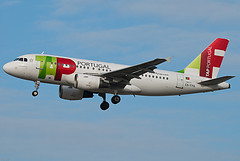
The International Air Transport Association (IATA) on June 5 announced the initiation of a carbon offset program as part of its efforts to survive in the current and projected economic climate. The industry lost $10.4 billion last year and expects to lose $9 billion this year due to falling demand and consumer confidence, along with the fear of pandemics.
The program allows airlines to offer passengers the ability to compensate for their carbon emissions with contributions towards carbon reduction projects in developing countries. The program is slated to begin with TAP Portugal, Portugal’s national airline.
Renewable Investments
The IATA Carbon Offset Program then invests in United Nations-approved Certified Emissions Reductions (CER) projects and voluntary credits which comply with the recognized Gold and or Voluntary Carbon Standards. Contributions from passengers go to the projects while participating airlines pay for all administration costs.
Fernando Pinto, CEO of TAP, acknowledged that offsetting is not a cure for climate change, but is “a responsible measure until technology can make us carbon-free.” TAP chose to sponsor a renewable energy project in Brazil, the Aquarius Hydroelectric Project, which is a grid-connected run-of-river hydropower plant, intended to partially replace fossil fuel-based electricity and reduce greenhouse gas emissions.
In a speech at the IATA Annual General Meeting and World Air Transport Summit in Kuala Lumpur, Malaysia, IATA's Director General and CEO Giovanni Bisignani said even in a recession the environment is at the top of the airline industry’s agenda.
“The biggest job in resizing and reshaping is our relationship with governments. It starts with climate change. Even in a recession, environment is at the top of our agenda. No other industry is as ambitious. Two years ago, I announced a vision to achieve carbon-neutral growth on the way to a carbon-free future. No other industry is as united. Our four-pillar strategy focuses all industry players on addressing climate change together. And no other industry has achieved so much. Seven percent is how much our emissions will fall this year,” he said.
Technology, Efficiency
The four pillars of the industry’s plan are investing in technology, improving operational efficiency, building and using efficient infrastructure and positive economic instrument to provide incentives.
Bisignani also noted that IATA set a target of 10 percent alternative fuels by 2017 and that four airlines have tested biofuels, making certification a reality by 2011. He criticized governments and oil companies for not providing enough funding toward aviation biofuels. Instead, governments have imposed meaningless taxes, he said, while other areas received tax breaks. Taxes charged last year did nothing for the environment, he said.
The industry, he said, has pledged to reach be carbon neutral by 2020; the first global industry to make such a commitment. He urged the International Civil Aviation Organization to define carbon emissions standards for manufacturers, air navigation service providers to make it possible to fly even more effectively, fuel companies to supply eco-friendly fuels and governments to provide the airline industry access to credits in global carbon markets.

